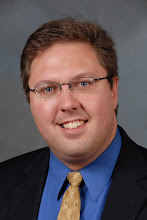The last two weeks of newspaper articles on candidate Joe Walsh have not been welcome publicity for his campaign. Walsh, who is running in the upcoming IL Republican primary for the 8th congressional district, is now in the position of having to defend himself against allegations that make him look like a political opportunist. Although Walsh is running as a self-proclaimed conservative Tea Party candidate, a January 14th article in the Daily Herald pointed out that this is a side of Walsh that voters have not seen before. Indeed, voters who are familiar with Walsh will remember that he has unsuccessfully run for office twice before. However, as the Daily Herald reports, this is the first time he has run as a conservative.
Walsh first ran for Congress in the more liberal 9th district in 1996. According to a 11/14/1996 article in the Morton Grove Champion, as the election was drawing to a close, “Walsh continued to insist that his moderate stances - including support for abortion rights and for gun control - could win with the historically Democratic 9th District populace.” Even though he insisted, “I'm not some right-wing conservative,” Walsh lost that race by an almost 2 to 1 margin.
Having failed in his bid for Congress, Walsh tried to win the race for State Representative in the 58th state district in 1998. By this time, Walsh was apparently even further to the left ideologically. For example, his then opponent, Jeff Schoenberg, apparently criticized Walsh for supporting a law allowing citizens to carry concealed guns during his failed 1996 congressional campaign. The Wilmette Life reported on 10/22/1998 that, “Walsh said his thinking on the issue had evolved in the last two years and that he would not vote for a Illinois concealed carry law.” According to his current campaign website, Walsh has gone back to his original 1996 position and now again supports conceal and carry laws.
Walsh’s explanation of his more liberal past is that he was more of a libertarian at the time and that he has now become more conservative. This would certainly explain his transition from being pro-choice to pro-life since libertarians advocate personal liberty and minimal government intrusion. However, this would not explain his previous support in favor of gun control since libertarians are strongly opposed to gun control legislation. Nor would it explain why before he changed from a social liberal to a social conservative he first changed from a social conservative to a social liberal.
In his 1996 congressional campaign Walsh was quoted in the 10/10/1996 Evanston Review as saying, “Fiscally, I've always been conservative, but if I've evolved politically, it's been as a social liberal.” So according to Walsh’s own statements, he had originally been more socially conservative, then he became more socially liberal and now he is socially conservative again. In his defense, Walsh did acknowledge in the recent Daily Herald article that he took a liberal stance on gay rights in 1996, “because I was running in
Walsh is now running in the more conservative 8th congressional district and indeed his positions are now conservative. Unfortunately for Walsh, in the midst of trying to defend his liberal past, the Walsh campaign was dealt another blow this week. The Pioneer Press reported yesterday that Walsh is now being sued by former campaign consultant Keith Liscio. According to the article, Liscio helped Walsh develop the strategy of having Walsh run as a Tea Party candidate for which Liscio was being paid $10,000 a month. Liscio’s firm, Patrickson-Hirsch Associates, claims that Walsh stopped making the agreed upon bi-monthly payments in October so they finally terminated their relationship with Walsh last month. They claim that Walsh still owes their firm $20,000, but that he has refused to pay them what he owes even though he continues to spend tens of thousands of dollars on his own campaign.
The allegation that Walsh’s Tea Party campaign strategy was the brain child of a high paid political consultant does not help Walsh dismiss criticisms that he is a political opportunist who changes his views to suit each campaign. Fortunately for Walsh, the election is less than two weeks away so there may not be enough time for these recent articles to do much damage in a not so well publicized primary race. However, if Walsh does manage to win the primary, these issues will substantially weaken him in the general election and will make it very difficult for him to finally win his first political race. No doubt the incumbent Democrat is already looking forward to the campaign ad possibilities.
